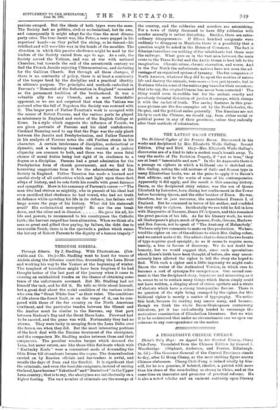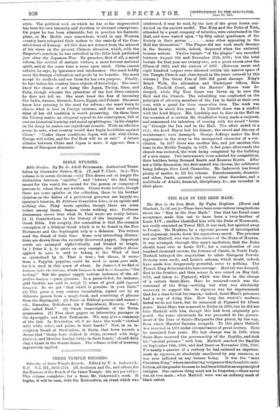A PROGRESSIVE CHINESE VICEROY.
China's Only Hope : an Appeal by her Greatest Viceroy, Chang Chih-Tung. Translated from the Chinese Edition by Samuel I. Woodbridge. (Oliphant, Anderson, and Ferrier, Edinburgh. 3s. Gd.)—The Governor-General of the Central Provinces stands to-day, after Li Hung Chang, as the most striking figure among Chinese statesmen. Chang Chih-Tung is indeed wholly by him- self, for he is a genuine, if belated, idealist, a patriot with more than his share of the race-feeling so strong in China, and at the same time an innovator and promoter of practical reforms. He is also a noted scholar and an eminent authority upon literary style. The political rock on which he has so far shipwrecked has been his own intensity and devotion to abstract conceptions. On paper he has been admirable, but in practice his fantastic plans, as Mr. Michie says somewhere, woull in any Western country have relegated their author to the custody of the Com- missioners of Lunacy. All this does not detract from the interest of his views on the present Chinese situation, which, with the Emperor's sanction, he has embodied in the little book published just after the Japanese War. He preaches, first of all, a moral reform, the revival of antique virtues, a more fervent national spirit, and at the same time a more open mind. China cannot subsist, he says, by ignorance and intolerance. She must boldly meet the foreign civilisation and profit by its benefits. She must accept its methods and use them for her own purpose. Finally, he lays before his country three objects of knowledge. She must know the shame of not being like Japan, Turkey, Siam, and Cuba, though wherein the splendour of the last three consists he does not tell us. She must know the fear of becoming like India, Annam, Burmah, Korea, Egypt, and Poland. She must know how pressing is the need for reform ; she must learn to choose what is best in foreign customs, and she must realise what of her old tradition is worth preserving. On these lines the Viceroy makes an eloquent appeal to his countrymen, full of curious historical learning and moral apophthegms. In his chapter on the Army he makes one significant remark. With an effective army, he asks, what country would dare begin hostilities against China ? "Under these conditions Japan will side with China, Europe will retire, and the Far East will be at rest." A future alliance between China and Japan is more, it appears, than a dream of European alarmists.





















































 Previous page
Previous page